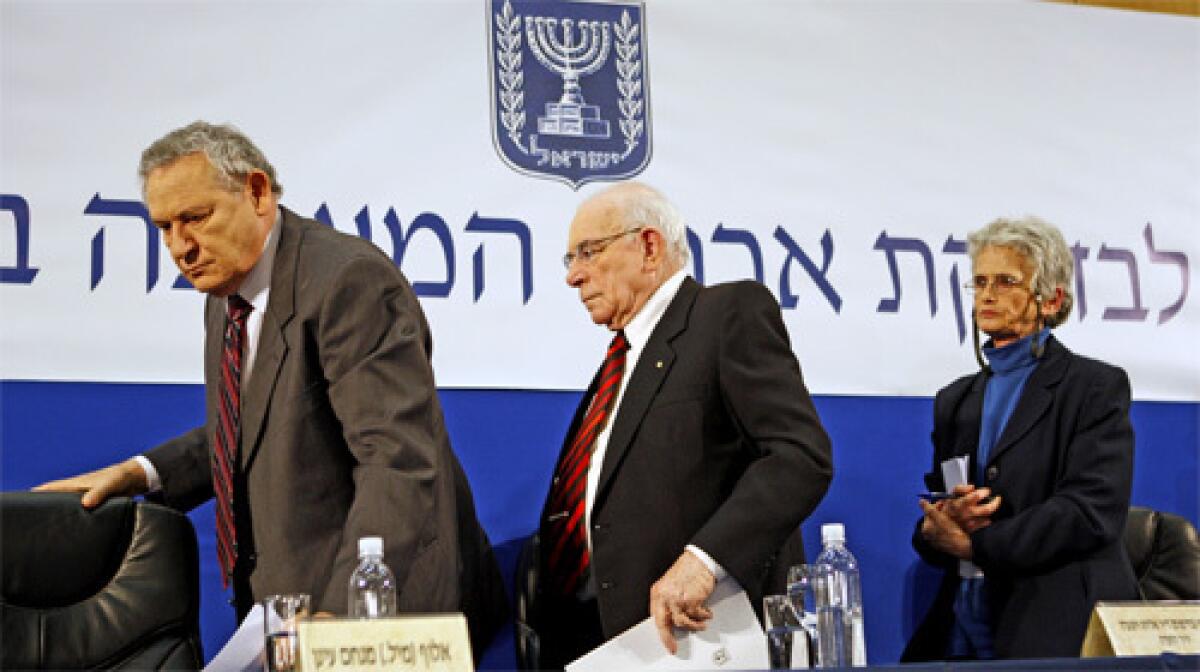Israeli panel faults 2006 war effort

- Share via
JERUSALEM — An official panel of inquiry found Wednesday that Israel’s failure to win the 2006 war in Lebanon stemmed from “flawed conduct” and “serious failings” by its political and military leadership, but concluded that Prime Minister Ehud Olmert acted in what he thought was the country’s best interest.
The final report on the panel’s 16-month investigation casts no personal blame on any leader. Critics of the embattled prime minister said that made it less likely he would soon be forced to resign.
Olmert has been struggling to stay in office since the 34-day war against Hezbollah, Israel’s first failure to vanquish an Arab foe in battle, and Wednesday’s judgment was a crucial test. His political survival is essential to President Bush’s goal of an accord to end the decades-old Israeli-Palestinian conflict before the end of his tenure in the White House.
Aides to the Israeli leader said he was relieved after a cursory reading of the report. A statement from his office said he would “thoroughly study” its recommendations and lead the Cabinet in a discussion of how to apply them.
The report’s immediate fallout will be clearer in the coming days as Olmert’s coalition partners study the 629-page document and decide whether to quit the government.
Political analysts said the coalition leaders were likely to stay in their positions for now.
“Olmert won’t fall because he’s managed to cobble together a coalition of every party that has no interest in holding early elections,” said Michael Oren, a senior fellow at the Shalem Center, a Jerusalem research institute, and a wartime reserve officer critical of the prime minister’s leadership. “He won’t fall because the Israeli economy is doing well and he is moving on the peace process.”
Wednesday’s report is nonetheless a harsh verdict on the Olmert government’s political and military conduct of a war that Israelis widely view as a psychological defeat.
The fighting erupted July 12, 2006, after Hezbollah guerrillas based in southern Lebanon killed eight Israeli soldiers and captured two others in a cross-border raid. It ended Aug. 14 with a U.N.-brokered cease-fire that left the militant Islamic group separated from the border by a multinational peacekeeping force.
But Israel’s military was unable to retrieve its captured soldiers, destroy Hezbollah or prevent the group from firing 4,000 rockets into northern Israel. Israeli bombardment of civilian areas in retaliation was strongly condemned by the international community, as was Hezbollah’s onslaught.
“A semi-military organization of a few thousand men resisted, for a few weeks, the strongest army in the Middle East,” said a summary of the report read on national television by Eliyahu Winograd, the retired judge who led the government-appointed panel.
That setback, he said, resulted from “a mixture of flawed conduct of [Israel’s] political and military leadership . . . of flawed performance by the military, especially the ground forces, and of deficient Israeli preparedness.
“Israel did not use its military force well and effectively, despite the fact that it was a limited war initiated by Israel itself. . . . Israel did not gain a political achievement because of military successes; rather, it relied on a political agreement . . . which permitted it to stop a war which it had failed to win.”
The conflict claimed the lives of 158 Israelis, of whom 119 were soldiers and 39 civilians, and at least 1,035 Lebanese, most of them civilians, according to official counts on both sides.
An interim report by the five-member panel last April censured Olmert, his defense minister at the time of the war, Amir Peretz, and their military chief of staff, Lt. Gen. Dan Halutz, for sending the army into battle unprepared and with no detailed plan or realistic goals.
That report, covering the first week of the war, prompted rebels in Olmert’s centrist Kadima party to demand his ouster, but he survived the revolt. The other censured officials resigned.
With Olmert’s job again on the line, political leaders awaited Wednesday’s report for its judgment of one of his most criticized wartime decisions: As cease-fire negotiations were being completed, Olmert ordered a major ground attack inside Lebanon on Aug. 11.
The offensive failed in its aim to surround Hezbollah forces and was aborted when the cease-fire took effect three days later. Thirty-three Israeli soldiers were killed.
Olmert has argued that the offensive resulted in a U.N. cease-fire resolution more favorable to Israel.
The latest report says it is not clear whether Israel reaped any such benefit, and it criticizes the leadership for vacillating over an offensive that began too late.
Yet the panel concluded that the goals of the operation were legitimate.
“There was no failure in that decision in itself, despite its limited achievements and its painful costs,” the report says. Olmert and his defense minister acted in “what they thought at the time was Israel’s interest.”
Myrtha Sheinbrum, whose son fought and died in that final offensive, was disappointed by the report. “It gave the prime minister a pass while blaming everything on the army,” she said.
Sheinbrum joined demonstrators outside Defense Minister Ehud Barak’s home in Tel Aviv in demanding that he deliver on a promise made last year to push for Olmert’s resignation or early elections after publication of the report.
If Barak pulls his left-leaning Labor Party’s 19-member faction out of the coalition, Olmert would no longer have a parliamentary majority and could be forced to call an election. His coalition controls 67 of parliament’s 120 seats.
But with polls showing that right-wing former Prime Minister Benjamin Netanyahu would win an election, confidants of Barak say he is no longer eager to hasten one.
More to Read
Sign up for Essential California
The most important California stories and recommendations in your inbox every morning.
You may occasionally receive promotional content from the Los Angeles Times.













